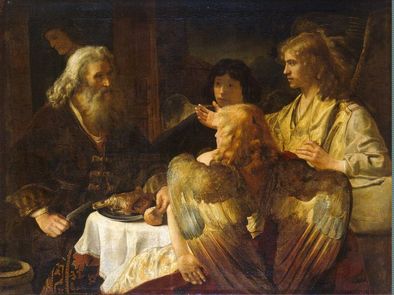 Rembrandt turned Abraham into a Dutch gentleman welcoming three men into his home. We, too, can imagine Abraham's hospitality in our own day.
Rembrandt turned Abraham into a Dutch gentleman welcoming three men into his home. We, too, can imagine Abraham's hospitality in our own day. We have designated this Shabbat as an evening for greeting new members of Temple Sinai. Tonight, even more than on most nights, we want to show that we are a congregation that extends the same warm hospitality to the newcomer that we use to greet an old friend. Tonight, we want to say as a community that we are so grateful for the participation and fellowship of all who walk into our doors.
There is actually a strong connection between the idea of hospitality and this week’s Torah portion. Believe me, I didn’t plan it that way, but I sure am going to take advantage of it in my talk tonight.
In this week’s Torah portion (Vayera) we have two extraordinary stories of hospitality. The first is a story about Abraham, who saw three strange men walk past his tent on a hot day. Abraham was so consumed by the desire and need to show hospitality that he ran out to urge the men into his home. He showed an enthusiasm for hospitality that would have been surprising even in his day.
The Torah tells us that Abraham said to the men, “My lords, if it please you, do not go on past your servant. Let water be brought; bathe your feet and recline under the tree. Let me fetch some bread that you may refresh yourselves.”
Needless to to say, this is not the way we imagine that strangers would be treated today. Can you imagine three strange men walking through the streets of Cranston and being invited into people’s homes to share a meal and to lie down on the sofa? Maybe chips and a beer to watch the Patriots game? Abraham represents the epitome and the ideal model for hospitality.
The men did come into Abraham’s tent. They ate, they drank, and they reclined. Because this is a biblical story, the three men turned out to be three angels and they gave Abraham important news about his future and God’s plans for him. Moral of the story: It pays to be a good host and to treat everyone, especially a stranger, as an honored guest.
The second story about hospitality in this week’s Torah portion does not have an ending that is nearly as happy as the first. Two of the same three men/angels who visited Abraham went next to visit Abraham’s nephew Lot, who lived in the city of S’dom. The story begins in a way that is similar to the first story:
“The two angels arrived in S’dom in the evening, as Lot was sitting at the city gates. When Lot saw them, he rose to greet them and, bowing low with his face to the ground, he said, ‘Please, my lords, come to your servant’s house. Spend the night and bathe your feet.’”
The Torah seems to go out of its way to show that Abraham and Lot treated their guests in similar fashion. But in the second story, things took an ugly turn.
The Torah tells us that the angel/men “had not yet lain down, when the townspeople, the men of S’dom, young and old – all the people, down to the last man – gathered around the house. They shouted to Lot and said to him, ‘Where are the men who came to you tonight? Bring them out to us, that we may know them.’”
I probably don’t need to tell you that the folks of Sodom we’re not asking for a formal introduction. They wanted to “know” Lot’s guests in the biblical sense – that is, they wanted to rape them.
Lot refused to turn over his guests, and things just got worse. Lot offered to give the townspeople his two virgin daughters instead of the guests, but the people refused. The people of S’dom were furious with Lot, an outsider who had only recently moved to their city. They said about him, “This fellow came here as a foreigner, and he already acts like he’s the king!” They shouted at Lot, “We will be worse with you than with your guests.”
The two angels protected Lot by striking the people with blindness. (It’s good to be a divine being). The angels, Lot, and his family made their escape from the city.
What is the difference in these two stories about hospitality? Both Abraham and Lot treated their guests with a high standard of hospitality. In one instance, everything went well. In the other instance, everything went horribly wrong. What made the difference?
In the commentaries of the rabbis, much is made of the fact that Abraham offered food and Lot did not, but that is a distinction in their personalities. It did not seem to affect the endings of the stories. The more obvious difference between the stories is their different settings. Abraham lived in a tent in the desert. He didn’t have to worry about anyone ruining his plans for his guests. Lot lived in an evil city, where his inhospitable neighbors would have made things miserable for his guests no matter how gracious a host he may have been.
It is the settings of the stories that determine their outcomes. If you live in the place where people are treated like dirt, it is virtually impossible to create warmth and welcome. Hospitality is not created by individuals. It is created by communities.
There is a lot of talk in the Reform Movement these days about creating congregations that exhibit “audacious hospitality.” The Union for Reform Judaism now even has a “Vice President of Audacious Hospitality.” The job description for this audaciously named position includes a mandate to foster welcoming atmospheres in Reform congregations that will warmly embrace those who have felt rejected by synagogues in the past.
This is, I think, a very worthy goal and it is exactly the kind of change that the Jewish world needs today. We need to become more welcoming to the stranger at our door. However – and I believe that the person who holds this position would agree – we will never create hospitality in the Jewish community just by appointing leaders to create that atmosphere. As this week’s Torah portion teaches us, the setting determines the outcome. You can’t have audacious hospitality in your synagogue if the synagogue is not filled with audaciously hospitable people.
Our congregation here at Temple Sinai tonight includes people who have joined us in the last year. We have set aside the Oneg this evening to meet our new members. If you are a new member of Temple Sinai, I hope you will meet some of our long-standing members. If you are a long-standing member, I hope you’ll have a chance tonight to meet some of our new members. I also hope that you’ll have conversations tonight – whether you are new or old to our congregation – about what draws you to this community. I hope you’ll hear other people talk about why they are members of this congregation.
I think you will hear stories about people who connected with the warm and sincere friendliness of this place. I think you’ll hear that – for many of our members – it is the most important reason why they came here, and why they stay here.
Hospitality is not something that is dictated from above. It cannot be created with a memo. It is about people and the way that people treat other people. It is about what we hold in our hearts.
Over the last year since I became a new member of Temple Sinai, I have found that the warm heart and caring practices of this congregation are the things I love most about it. You can’t teach that. It is an intrinsic part of what makes this congregation a genuine community.
When you walk into the doors of Temple Sinai, remember that the hospitality we show to everyone – newcomers and old-timers – is the result of the heart that each of us brings into this place. We don’t need an Abraham to stand at the door and usher people in to create a place of community. Much more than leaders, we need good townsfolk. We need to be a place where the stranger is treated as a treasure, and where no one can be a newcomer for very long. That is what I love about Temple Sinai, and it is what I hope will always be.
Shabbat shalom.


 RSS Feed
RSS Feed
